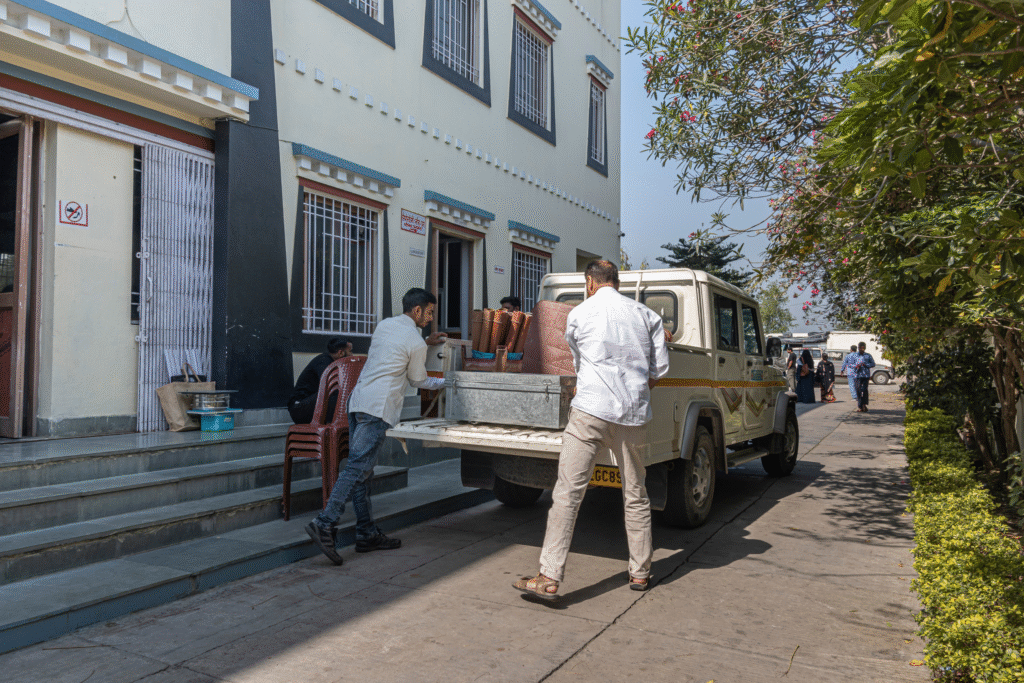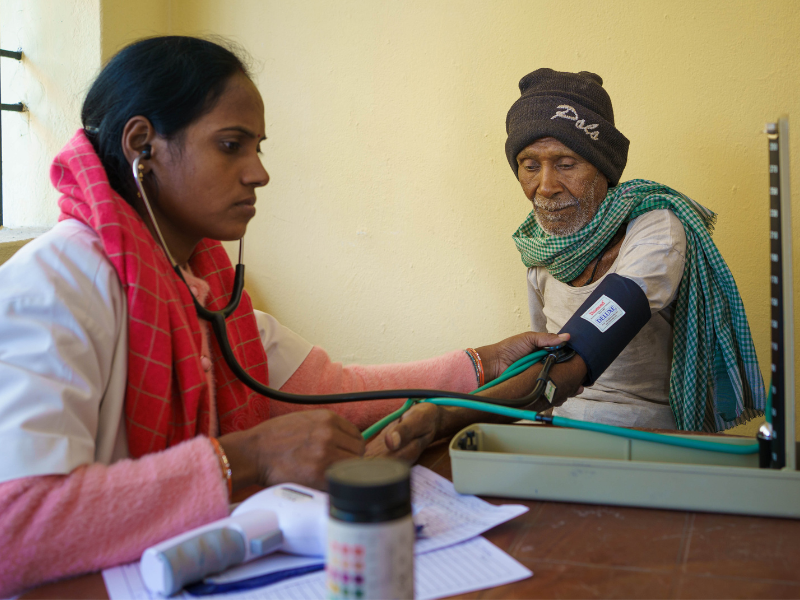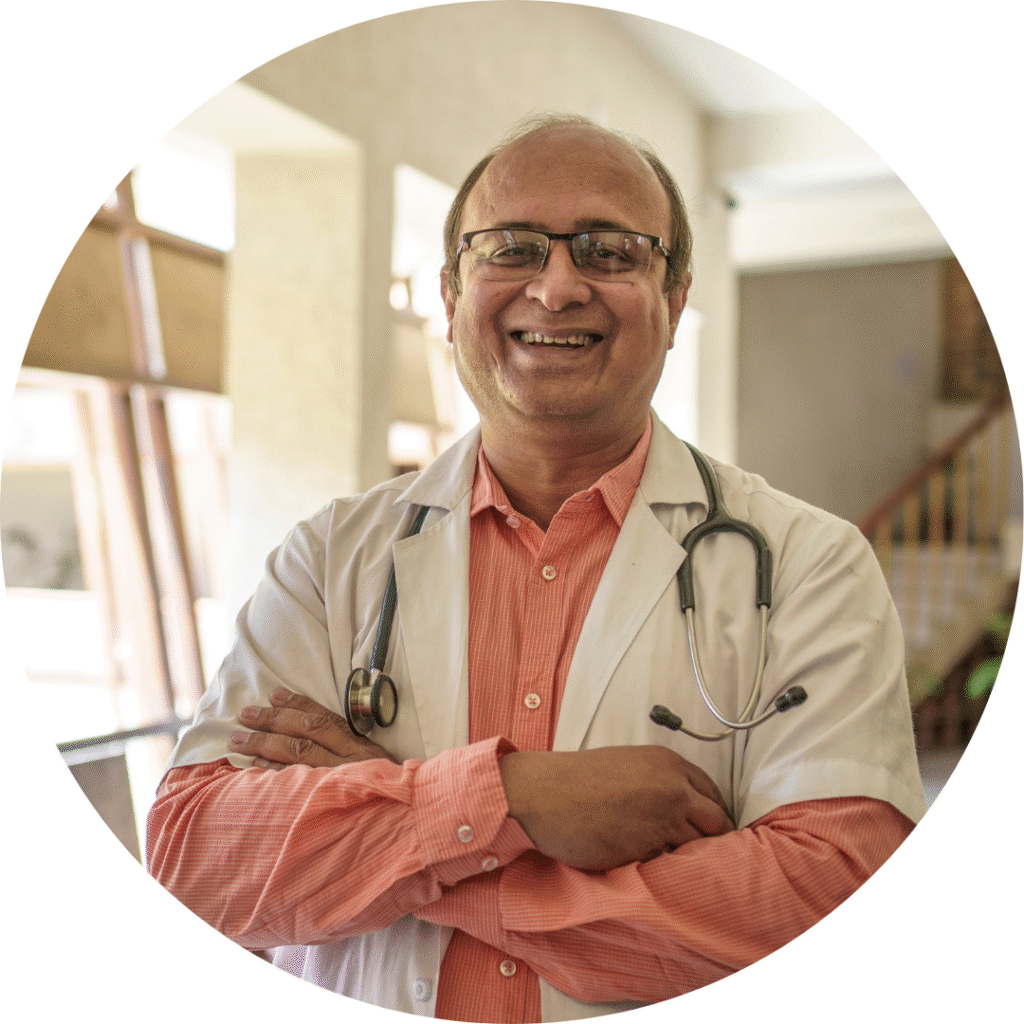The Challenges of healthcare access in northern India
In Bihar and Jharkhand, rural populations face serious health issues linked to malnutrition, poor sanitation, and the isolation of their homes. These factors contribute to the spread of various diseases, while the shortage of medical infrastructure worsens the situation.
Indeed, most public health centers suffer from significant shortcomings: a lack of essential medicines, inadequate facilities, insufficient diagnostic equipment, and a shortage of qualified personnel. According to the Health Dynamics India report from the Ministry of Health and Family Welfare, by 2025, Community Health Centers are expected to have a shortfall of about 80% in doctors, nurses, and other healthcare professionals.
Poor road conditions also hinder access to healthcare for villagers. Without paved roads, many remain cut off during heavy rains and storms.
Providing a tailored response to community needs
In this context, Karuna-Shechen’s mobile clinics strive to bring essential healthcare directly to isolated communities.
Launched in 2002 in four villages in the Gaya district, this initiative quickly expanded to meet the growing demand from neighboring rural communities. Over the past twenty years, our mobile clinics have broadened their scope and diversified their services, moving from general medicine to specialized consultations to better support local populations.

Caring for everyday illnesses
By rotating between different villages, our mobile clinics address a wide range of ailments: scabies, fungal and respiratory infections, fever, muscular and back pain, while also observing an increase in diabetes cases. In addition, our prenatal and postnatal care services (ANC) are crucial to reducing infant mortality rates.
The frequency of visits is adapted to the specific medical needs of each community, ensuring that healthcare remains accessible to as many people as possible.



Ebrahim, a 70-year-old resident of the remote village of Sagarpur in Bihar, suffered from hypertension and chronic lung disease for years without access to appropriate medical care. Upon hearing about Karuna-Shechen’s mobile clinic, he immediately sought help.
“I have been undergoing treatment for the past 3 months at the mobile clinic. My health has improved remarkably since the start of the treatment. The mobile clinic service by Karuna-Shechen has made life so much easier for me and my fellow villagers. We no longer have to depend on the primary health centre located several kilometers away from our village.”
The key players of mobile medicine
The successful operation of mobile clinics relies on careful preparation and a committed team.

A doctor

A nurse

A supporting pharmacist
The day before each visit, our community health workers inform and mobilize the villagers. On the day of the visit, the team prepares the vehicle, travels to the village, and sets up the clinic, often in locations such as Anganwadis (rural child care centers). Each session concludes with answering health-related questions and providing preventive health education.
Dr. Sanjeev Kumar, the lead doctor, finds intrinsic motivation in serving rural populations. He explains:

In mobile clinics, we treat many patients who have been suffering for a long time, as the nearest community health center is several kilometers away. Patients also find it more convenient to continue their treatment with our mobile clinics rather than traveling to distant facilities.
Doctor Sanjeev Kumar
A wide range of services for rural communities
To best meet patients’ medical needs, our clinics are equipped with essential diagnostic tools, including blood pressure monitors, blood glucose analyzers, thermometers, urine pregnancy tests, and basic urine test kits. The services offered by our clinics include:

Prenatal and postnatal care

Physiotherapy and acupuncture services

Awareness campaigns on hygiene, sanitation, nutrition, and menstrual health

Free distribution of medicines

Medical consultations

Diagnostic services
On average, 50 to 60 patients are cared for during each mobile clinic visit, many of whom are children. Regardless of their reason for consultation, children receive multivitamin syrup as part of preventive care.


Our mobile clinics serve pregnant women, breastfeeding mothers, and school children free of charge. For other patients, a symbolic fee of 50 rupees per consultation is requested — a cost far lower than hospital expenses, making healthcare much more affordable. Medicines are distributed free of charge at every consultation.
Focus on physiotherapy
Physiotherapy is the latest service added to the mobile clinics in Bihar. It aims to prevent, relieve, or rehabilitate motor, functional, or physical disorders. Common health issues treated during physiotherapy camps include chronic back pain, joint pain, muscle stiffness, and post-injury rehabilitation. Currently, physiotherapy camps are held weekly in two villages: Nawadih and Kewla. We hope to extend these services to more villages in the near future.
Shanti Devi, a 50-year-old resident of Kewla village, suffered from severe right shoulder pain for six months. Following advice from our doctors, she regularly attended physiotherapy sessions at the mobile clinic in her village. Additionally, she received home remedy advice, such as using hot compresses, ice packs, and specific shoulder exercises.

With consistent care and support, my pain has now completely subsided. I am so relieved and happy.
Shanti Devi, mobile clinic patient
Overcoming obstacles for sustainable healthcare access
The remoteness of villages, combined with poor road conditions, makes travel challenging and time-consuming. To overcome these obstacles, our healthcare teams carefully plan their routes and work with local community health workers to pre-assess medical needs.

Traveling long distances on rough roads and spending long hours under the heat is difficult, but seeing the impact our mobile clinics have on villagers’ health lifts my spirits tremendously
Jaba Moni Soren, a nurse on the Jharkhand medical team
Our clinics go beyond addressing the immediate medical needs of rural communities. They contribute to long-term health improvements by promoting preventive healthcare, treating chronic illnesses early, and raising health awareness among rural populations.
Karuna-Shechen’s mobile clinics bring essential care where isolation once made healthcare access difficult. By combining medical expertise with local engagement, they offer prevention, diagnosis, and follow-up services to sustainably improve the well-being of communities in Bihar and Jharkhand. This model of proximity strengthens solidarity and upholds the dignity of each individual.